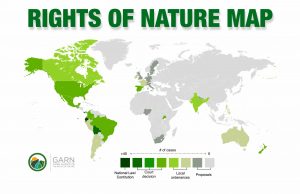Will This be the Year for Rights of Nature?
Jan 29th, 2024 | By admin | Category: Other Resources, Planetary Well-BeingBy Suzanne York.
The coming years might be a wild ride. 2023 was the warmest year on record, and this year could be even hotter. Nature is declining globally at rates unprecedented in human history, and the rate of species extinctions is accelerating. Human activities are impacting the world to such an extent that our epoch is being called the Anthropocene. Most of the ways we are changing it are not necessarily for the better.
As we endure droughts, floods, severe storms and many other aspects of climate disruption, it might be time to consider new concepts on protecting the only planet we call home. One such construct is that of rights of nature, not exactly a new idea, as it’s based on indigenous views from centuries past.
Nature’s rights, as defined by the Global Alliance for Rights of Nature, is the recognition that Earth’s ecosystems – trees, oceans, animals, mountains – have rights just as human beings have rights. Rather than treating nature as property under the law, as humans have been doing for millennia, rights of nature acknowledges that nature in all its life forms has the right to exist, persist, maintain and regenerate its vital cycles.
It is gaining traction in a number of countries. At least six countries – Ecuador, Bolivia, Panama, Uganda, New Zealand and Spain – have some form of national law recognizing the rights of nature or legal personhood for ecosystems.
Now Ireland could become the first country in the European Union to enshrine the rights of nature into its national constitution. The proposal, by the Joint Committee on Environment and Climate Action, has recommended the Irish government advance a referendum on safeguarding biodiversity.
Panama, too, is moving forward with rights of nature, having passed a country-wide law in 2022. Last year, the Panamanian Supreme Court ruled that a huge mineral mine as unconstitutional and must be shut down. Another recent Panamanian law gives sea turtles “the right to an environment free of pollution and other human impacts that cause physical or health damage, like climate change, incidental capture, coastal development and unregulated tourism.”
In the words of David Godfrey, executive director of Sea Turtle Conservancy in Florida, “These animals have a right to exist, whether or not they benefit us. They do happen to benefit us in many ways. But they have a right to exist, even if they don’t.”
One other arena of hope, perhaps surprisingly, is the COP climate negotiations. Last year, the final agreement of COP28 included recognition that climate change threatens ecosystems and the billions of people who depend on them.
A joint COP28 statement on nature, climate and people said there is no path to the goal of limiting warming to 1.5 degrees Celsius “without urgently addressing climate change, biodiversity loss and land degradation together in a coherent, synergetic and holistic manner, in accordance with the best available science.”
While the COP isn’t exactly a bastion of progressive action, it is encouraging to see it taking up the obvious links with Nature.
Humanity has plundered and disrespected the planet, thereby creating an imbalance that is perpetuating potential collapse. We are likely in the Sixth Mass Extinction, and continue to poison our soils, air and water, and disregard the rights of future generations to a livable world.
While we have many of the solutions to address our myriad of crises, from renewable energy to ‘sustainable’ consumption to meeting the rights of women and men for reproductive health services, looking at Nature through a less human-centric view is the answer to changing course.
Humans can’t engineer our way out of our planetary predicament. Human ingenuity, especially in terms of technology, may come up with an astonishing solution that rapidly alters the situation. Or it may not. Either way, it would behoove humans to see we are interconnected with all species on Earth, and any lasting solution needs to incorporate this reality.
It should be obvious to state this, but Nature doesn’t need humans. People, however, need Nature. We have been warned many times over. May 2024 be the year of rights of nature and a learned appreciation for our place as part of nature’s whole.



